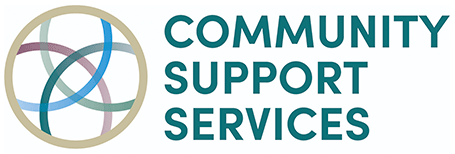At Community Support Services, case management incorporates assessment, planning, facilitation and advocacy for services that meet a client’s health needs. Our case management team coordinates with departments across the agency and community to deliver the best outcomes for our clients’ treatment.
Regional Case Management
The majority of clients receiving services from CSS are assigned to one of four regional case management teams. Assignment is based on the client’s ZIP code.
A client’s case manager is a partner in the recovery process. Together, they develop a treatment plan based on your needs, abilities and preferences. The treatment plan guides the services a client receives, with an emphasis on self-efficacy and self-sufficiency. Services are delivered in the community – clients’ homes, community sites, jails, hospitals, etc. The case manager is able to connect the client to agency resources and community supports, as needed.
Assertive Community Treatment
Since 1994, CSS’s Assertive Community Treatment (ACT) program has served as a multidisciplinary team providing case management, outreach, rehabilitation and support for clients who need a more intensive level of care. Clients referred to ACT typically have a history of multiple hospitalizations and crisis intervention visits.
CSS has several ACT teams available to assist clients.
Assertive Community Treatment (ACT) Teams provide wrap-around services for persons with more intensive needs requiring frequent community contact to maintain stability, including those with significant mental health and substance use concerns. Clients are assigned to ACT teams based on several factors, including geographical region.
Mental Health Court
The CSS Mental Health Court program is a specialized service in partnership with local municipal courts and the ADM Board. The goal of the Court is to divert adults in Summit County with serious and persistent mental health diagnosis, facing misdemeanor charges, from the jail and criminal justice system. Defendants receive case management, psychiatric, vocational and residential services, as appropriate. These services are provided in conjunction with the defendant, family members, probation office, and the Municipal Courts in the Cities of Akron, Stow and Barberton.
HOPE COURT
CSS has contracted with Summit County to provide case management and recovery specialist staff for the HOPE Court program. HOPE Court (Healing, Opportunity, Progress & Empowerment) is the first felony specialized court for individuals in Summit County who have been diagnosed with a severe and persistent mental health illness. As a certified specialized docket with the Ohio Supreme Court, HOPE Court aims to improve life stability and independence while reducing recidivism. It is a community wide effort that engages local agencies and the court in an effort to develop a strong mental health recovery plan for the offender while also helping to provide skills for the individual to be a successful member of the community.
Forensic Services
CSS offers a comprehensive forensic mental health program that works with clients who are found “Incompetent to Stand Trial or “Not Guilty by Reason of Insanity.” When a client with this legal status is eligible for release from the state hospital, the client is placed on Conditional Release (CR) and needs continuity of care to transition to a less restrictive setting.
CSS provides an intensive level of behavioral health services in the least restrictive setting consistent with public safety and the welfare of the client. Typically, the client is required to maintain weekly contact with their case manager, see a psychiatrist at least monthly and participate in weekly group counseling. CSS is required to make regular reports to the court regarding the client’s participation and progress.
Since 2013, CSS has also run a Forensic Assertive Community Treatment (FACT) program to serve clients with psychosis, extensive criminal history and a current misdemeanor charge. Eligible clients are court-ordered to participate in the program. The FACT program is not available to persons with sexual offenses and/or persons designated as registered as sex offenders.
Representative Payee Program
CSS offers a representative payee program for clients receiving benefits (SSI/SSD) from the Social Security Administration and with a demonstrated need of assistance with money management. The client will work with their case manager or a benefits specialist to develop and periodically review a budget, to ensure rent, utilities and other basic needs are met. The program’s goal is to empower clients to live independently through responsible living and money management.

